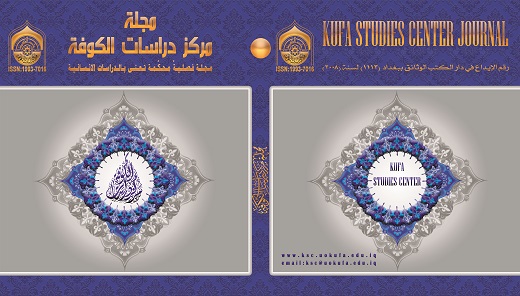دور القيادة المستدامة في تحقيق التفوق التنظيمي دراسة تحليلية في مطار النجف الاشرف الدولي
DOI:
https://doi.org/10.36322/jksc.v1i49.5047Abstract
انطلق البحث من مشكلة واقعية تجسدت بعدد من التساؤلات النظرية والتطبيقية, للتعرف على الأطر المفاهيمية لمتغيرات البحث الرئيسة والفرعية( القيادة المستدامة والتفوق التنظيمي), فضلا عن اختبار علاقات الارتباط والتأثير بين متغيرات البحث للتعرف على أبعاد القيادة المستدامة الأكثر مساهمة في تحقيق التفوق التنظيمي.
اعتمد البحث استمارة الاستبيان كأداة رئيسة لجمع البيانات والمعلومات, والتي تألفت من (35) فقرة موزعة على متغيري البحث, خصصت (20) فقرة منها لأبعاد القيادة المستدامة, و(15) فقرة خصصت لأبعاد التفوق التنظيمي. واختير مطار النجف الاشرف الدولي موقعا لأجراء البحث, إذ اختيرت عينة عشوائية من الموظفين في المطار (مدير,م.مدير, ملاحظ, م.ملاحظ, محاسب,م.محاسب,قانوني, م.قانوني, وفني) كونهم مسؤولين في مواقع عملهم, وهم على دراية وخبرة بسبل سير الأعمال في المطار.إذ بلغ عدد الذين وزعت عليهم استمارة الاستبيان(220) موظفا, تم استرجاع (211) استبانة, أي بنسبة استرجاع (96%), وبعد فرز البيانات تم استبعاد (4) استمارات غير صالحة للتحليل الإحصائي, لتصبح الاستمارات الصالحة للتحليل الإحصائي هي (207) استمارة وهي عينة البحث. واستعمل البحث أدوات إحصائية لا معلميه في تحليل ومعالجة البيانات والمعلومات بالاعتماد على البرنامجين الإحصائيين SPSS,20)) و (AMOS,20).
وتوصل البحث إلى مجموعة من الاستنتاجات النظرية والعملية , كان أبرزها وجود علاقة ارتباط وتأثير معنوية للقيادة المستدامة في التفوق التنظيمي, فضلا عن حاجة المطار لمزيد من الاهتمام ببعد التنوع من خلال جذب واستقطاب موظفين ذوي ثقافات متنوعة ولديهم علاقات عمل مع مطارات وشركات طيران عالمية.
This paper was an attempt realistic problem embodies a number of intellectual and practical questions, answers targeted to identify the conceptual frameworks for the main and sub-research variables of paper (i.e. sustainable leadership and organizational excellence). As well as test correlation and influence between search variables to identify dimensions of sustainable leadership most conducive to achieving organizational excellence.
The research questionnaire was adopted as a main tool for collecting data and information, consisting of (35) items distributed among the research variables, (20) of which were devoted to the dimensions of sustainable leadership, and (15) items devoted to the dimensions of organizational excellence. Al-Najaf International Airport was chosen as a location for conducting the research. A random sample of employees was selected at the airport. As they are in charge of their workplaces and are knowledge with the way the airport works. The number of respondents has been distributed (220) employees, retrieved (211) questionnaire, ie retrieval rate (96%), and after the data were excluded (4) forms are not valid for statistical analysis, the forms valid for statistical analysis is (207) questionnaire is a paper sample. Also, a statistical means represented by (SPSS20) (AMOS,20) software is used to analyze and process the collected data and information. The current paper has arrived at number theoretical and applicative ,The most prominent of which was the relationship of correlation and the significant impact of sustainable leadership in organizational excellence, As well as the airport's need for more attention after diversity by attracting and attracting staff with diverse cultures and working relationships with airports and international airlines.
Downloads
Downloads
Published
How to Cite
Issue
Section
License
Copyright (c) 2022 مجلة مركز دراسات الكوفة | Journal of Kufa Studies Center

This work is licensed under a Creative Commons Attribution 4.0 International License.
Permit others to distribute and copy the manuscript, to create extracts, abstracts, and other revised versions, adaptations, or derivative works of or from the manuscript (such as a translation), to include in a collective work, to text or data mine the article, even for commercial purposes, as long as they credit the author(s), do not represent the author as endorsing their adaptation of the article, and do not modify the article in such a way as to damage the author''''s honor or reputation. Further details are found at Creative Commons Attribution 4.0 International (CC BY 4.0)






























